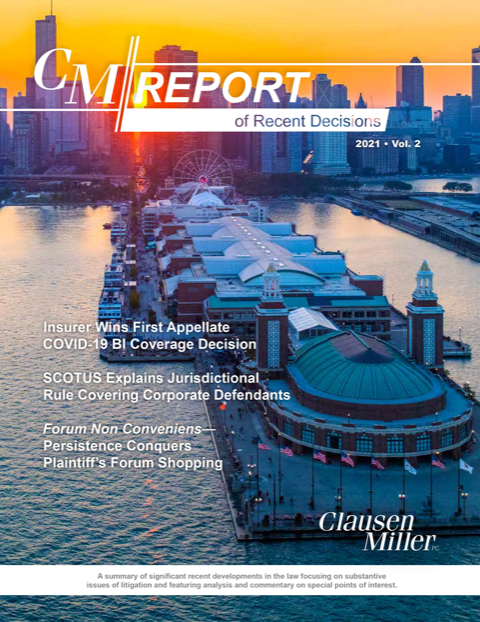CM Report of Recent Decisions – 2021 Volume 2

More Tales From The Minefield—Or Why Appellate Counsel Is A Must During Litigation
In this quarter’s Sidebar, we report on two recent federal appellate decisions illustrating the wisdom of employing trained appellate practitioners.
United States Supreme Court Holds That Prevailing Defendants On Appeal Are Entitled To The Full Amount Of Premium Supersedeas Bond Costs From A Losing Plaintiff
In City of San Antonio, Texas v. Hotels.com, L.P., No. 20-334 (U.S. 5-27-21), the Supreme Court issued a unanimous ruling crucial and beneficial to defendants seeking to stay a money judgment in federal court pending appeal. The Court ruled that a district court had no discretion to reduce the amount of surety bond premiums assessed as costs against the plaintiff-appellee who lost on appeal.
Illinois Supreme Court Decides “Unanswered Question” Under The Illinois Contribution Act
In Volume 3 of our 2020 CM Report, we reported on an order issued by the United States Court of Appeals for the Seventh Circuit in Roberts v. Alexandria Transp. Inc., 968 F.3d 794 (7th Cir. 2020), certifying to the Illinois Supreme Court an unanswered question arising under Section 3 the Illinois Contribution Act. Section 3 provides that each tortfeasor owes no more than his/her/its pro rata share of the common liability, except where the obligation of a tortfeasor is “uncollectable”. In that event, the remaining tortfeasors must share in the uncollectable obligation on a pro rata basis. The Seventh Circuit asked the Illinois Supreme Court to decide “whether the obligation of a settling party is uncollectable” under Section 3 of the Illinois Contribution Act.
Insurer Wins First Appellate Decision Addressing COVID-19 Business Interruption Coverage
In the first appellate decision nationwide addressing business interruption coverage for COVID-19 pandemic related losses, the Eighth Circuit ruled for the insurer, holding that Cincinnati Insurance Company does not have to pay an Iowa dental clinic for losses due to government-imposed COVID-19 restrictions. Oral Surgeons PC v. The Cincinnati Insurance Co., No. 20-3211 (8th Cir. July 2, 2021).
Home Is Where You Make It: SCOTUS Explains The Jurisdictional Rule Covering Corporate Defendants
We all have a place we call home. Over a lifetime, the average person will own three houses. Some people may simultaneously own more than one. But that’s nothing compared to corporations, some of which operate in all 50 states.
Extrinsic Evidence Properly Considered In Coverage Denial For Sexual Molestation
The evidence on which an insurer may rely in making a decision whether to defend an insured constitutes a frequent issue in liability coverage matters. Some jurisdictions subscribe to the “eight corners” rule, meaning that the insurer must confine its attention to the “four corners” of the underlying complaint and the “four corners” of the policy. Other jurisdictions require and/or allow an insurer to look to “extrinsic” evidence, for purposes of finding, or negating, or both, a defense obligation. Illinois follows the latter approach, at least under certain circumstances, as evidenced by Freeburg Community Consolidated School District No. 70 v. Country Mutual Insurance Co., 2021 IL App (5th) 190098.
Forum Non Conveniens—Persistence Conquers Plaintiff’s Forum Shopping
A motion based on forum non conveniens is a great tool that allows a court to dismiss or transfer a case to a forum better suited to hear the case. The court’s power to transfer the case to a more appropriate forum is discretionary, unlike the mandatory transfer of a lawsuit based on theories such as improper venue.
TMI!: HIPAA Informs State Law Negligence Claims
Americans value their privacy. They particularly value it regarding medical matters. The reasons are many. A disclosure of private medical information can adversely impact a person’s employment. It can call unwanted attention to a person’s condition. It can impact personal relationships. It can even be downright embarrassing, requiring explanations that some would rather not make.
Alert On Illinois Personal Injury And Wrongful Death Actions: Prejudgment Interest On Those Judgments Is Effective On July 1, 2021
We had earlier reported on efforts by the Illinois legislature to assess prejudgment interest on personal injury and wrongful death judgments. That legislation stalled, but a compromise bill was passed and signed into law on May 28, 2021, with an effective date of July 1, 2021.
Skin In The Game: Insurers’ Standing To Seek Subrogation For Attorneys’ Malpractice In Defending Insureds
It’s stating the obvious, but we live in a litigious society. Truth be told, there is probably a lawsuit or two we’d all like to file. Fortunately, cooler heads prevail more often than not.
 Melinda S. Kollross
Melinda S. Kollross Joseph J. Ferrini
Joseph J. Ferrini Private: Edward M. Kay
Private: Edward M. Kay Paul V. Esposito
Paul V. Esposito Don R. Sampen
Don R. Sampen Scott R. Shinkan
Scott R. Shinkan Private: Alexander J. Brinson
Private: Alexander J. Brinson Amy R. Paulus
Amy R. Paulus Private: Anne E. Kevlin
Private: Anne E. Kevlin